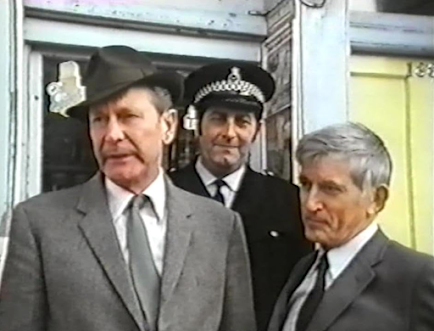There are films that change your life. This is not one of them. Paganini Strikes Again is the sort of film you find on a dusty VHS tape between Chitty Chitty Bang Bang and that one documentary your uncle made about canals. It’s 59 minutes of mildly anarchic British youth energy, stuffed into a Children’s Film Foundation casing so charmingly earnest, it’s like being gently mugged by Paddington Bear. With music. And yellow boots.
A Symphony of Modest Ambitions
The film is based on Benjamin Lee’s 1972 book of the same name, which no one remembers reading, but someone at Interfilm clearly did. The Children’s Film Foundation—a government-funded beacon of wholesome post-war cinema—saw in Lee’s story an opportunity to teach British kids two vital lessons: crime doesn’t pay, and music will get you out of a container unit if you’re clever enough to play a trumpet through a box.
Director Gerry O’Hara, better known for his adult dramas and dalliances with more serious cinema, clearly took a sabbatical from existential malaise to deliver this brisk caper for the juvenile set. Screenwriter Michael Barnes adapts the source with the narrative tightness of a TV procedural and just enough humor to keep parents from sneaking off during the screening. The result? A film that feels like a Sunday matinee crossed with a school safety video, but with better lighting.
Yellow Boots and the Musically Inclined Mob
The casting is…decidedly British. Julie Dawn Cole (best remembered as Veruca Salt in Willy Wonka & the Chocolate Factory) plays Nicola, the requisite “sensible girl” thrown in to add logic to the boys’ saxophone-driven nonsense. Dudley Sutton, who has played more criminals than actual criminals, gives a delightfully greasy turn as Mr. Raddings, the boot-wearing villain with all the subtlety of a pantomime baddie.
Philip Bliss and Andrew Bowen, as the crime-busting duo Bill and Mike, offer the kind of cheerful bromance usually reserved for 1970s cereal commercials. The production values are modest but efficient. The highlight? A chase scene through the Elephant and Castle Shopping Centre that, despite the Monthly Film Bulletin’s protest, is worth the price of admission just to see pre-gentrified escalator warfare. It’s the British New Wave if the wave had been filled with harmonicas and plot-convenient musical cues.
Fugues and Footnotes
Contemporary critical response was mixed, with The Monthly Film Bulletin praising its script while also making it clear that the escalator scene would not be nominated for a BAFTA. The film’s score, by Kenneth V. Jones, may be its secret weapon—clever, playful, and more emotionally intelligent than a surprising number of modern blockbuster soundtracks. When in doubt, give a kid a trombone and cue the whimsical bassoon.
In the United States, the Chicago Tribune gave it a quiet nod, calling it “excellent quality,” which is midwestern-ese for “better than expected, but I wouldn’t tell my friends I watched it.” While Paganini Strikes Again never quite reached cult status, it lives on in film society retrospectives and the occasional nostalgic YouTube comment thread from someone claiming it “taught me more than my parents.”
A Minor Key in a Major World
So, is it worth watching? Absolutely—if only to remind yourself that there was once a time when British children’s cinema didn’t involve CGI rodents or traumatizing orphans. Paganini Strikes Again plays like a B-side on the album of British film history: catchy, unassuming, and occasionally off-key, but damn if it doesn’t stick in your head.
⭐️⭐️⭐️ (3/5)
#YellowBootJustice #ContainerCaper #PaganiniRedux #ChildrenFilmFoundation #BeforeMarvelRuinedEverything






No comments:
Post a Comment